中国见面问候礼仪英语作文 600字
中国礼仪文化中问候方式的介绍英文作文
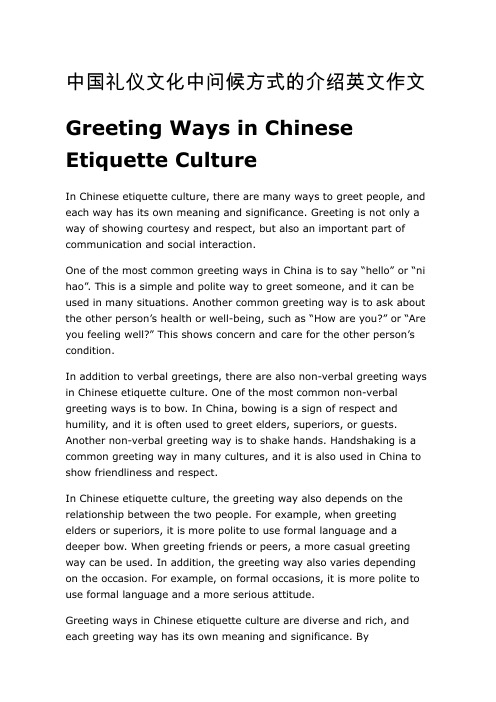
中国礼仪文化中问候方式的介绍英文作文Greeting Ways in Chinese Etiquette CultureIn Chinese etiquette culture, there are many ways to greet people, and each way has its own meaning and significance. Greeting is not only a way of showing courtesy and respect, but also an important part of communication and social interaction.One of the most common greeting ways in China is to say “hello” or “ni hao”. This is a simple and polite way to greet someone, and it can be used in many situations. Another common greeting way is to ask about the other person’s health or well-being, such as “How are you?” or “Are you feeling well?” This shows concern and care for the other person’s condition.In addition to verbal greetings, there are also non-verbal greeting ways in Chinese etiquette culture. One of the most common non-verbal greeting ways is to bow. In China, bowing is a sign of respect and humility, and it is often used to greet elders, superiors, or guests. Another non-verbal greeting way is to shake hands. Handshaking is a common greeting way in many cultures, and it is also used in China to show friendliness and respect.In Chinese etiquette culture, the greeting way also depends on the relationship between the two people. For example, when greeting elders or superiors, it is more polite to use formal language and a deeper bow. When greeting friends or peers, a more casual greeting way can be used. In addition, the greeting way also varies depending on the occasion. For example, on formal occasions, it is more polite to use formal language and a more serious attitude.Greeting ways in Chinese etiquette culture are diverse and rich, and each greeting way has its own meaning and significance. Byunderstanding and using these greeting ways properly, we can better communicate and interact with others, and show respect and courtesy to them.。
英语作文中国习俗问候方式
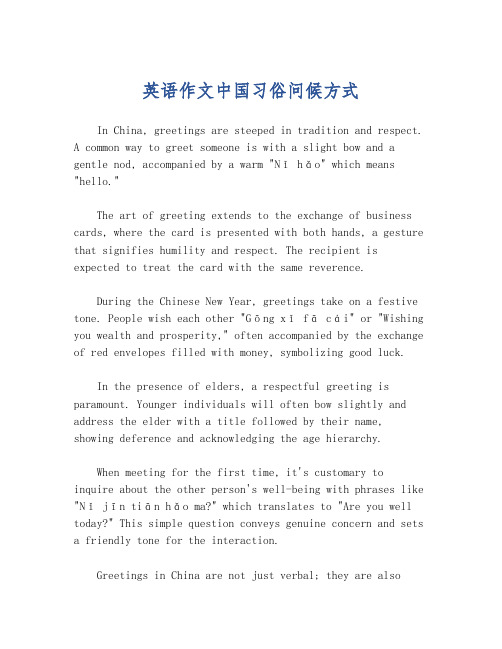
英语作文中国习俗问候方式In China, greetings are steeped in tradition and respect.A common way to greet someone is with a slight bow and a gentle nod, accompanied by a warm "Nǐ hǎo" which means "hello."The art of greeting extends to the exchange of business cards, where the card is presented with both hands, a gesture that signifies humility and respect. The recipient is expected to treat the card with the same reverence.During the Chinese New Year, greetings take on a festive tone. People wish each other "Gōng xǐ fā cái" or "Wishing you wealth and prosperity," often accompanied by the exchange of red envelopes filled with money, symbolizing good luck.In the presence of elders, a respectful greeting is paramount. Younger individuals will often bow slightly and address the elder with a title followed by their name, showing deference and acknowledging the age hierarchy.When meeting for the first time, it's customary toinquire about the other person's well-being with phrases like "Nǐ jīn tiān hǎo ma?" which translates to "Are you well today?" This simple question conveys genuine concern and sets a friendly tone for the interaction.Greetings in China are not just verbal; they are alsoabout body language. A firm handshake might be used in more formal settings, but it's the accompanying smile and eye contact that truly convey sincerity.In the digital age, traditional greetings have adapted. Social media platforms are flooded with digital greetings during holidays, a modern twist on an ancient custom that keeps the spirit of connection alive.Overall, the Chinese way of greeting is a beautiful blend of respect, warmth, and cultural heritage, reflecting the values of harmony and community that are deeply rooted in Chinese society.。
中国关于问候的传统和习俗英语作文
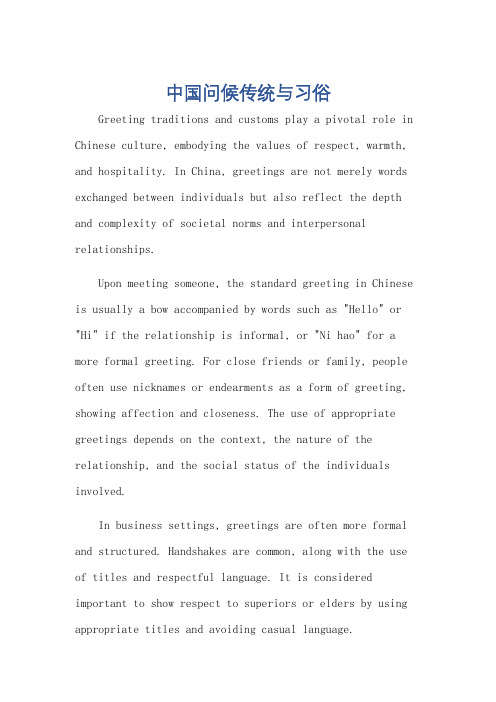
中国问候传统与习俗Greeting traditions and customs play a pivotal role in Chinese culture, embodying the values of respect, warmth, and hospitality. In China, greetings are not merely words exchanged between individuals but also reflect the depth and complexity of societal norms and interpersonal relationships.Upon meeting someone, the standard greeting in Chinese is usually a bow accompanied by words such as "Hello" or "Hi" if the relationship is informal, or "Ni hao" for a more formal greeting. For close friends or family, people often use nicknames or endearments as a form of greeting, showing affection and closeness. The use of appropriate greetings depends on the context, the nature of the relationship, and the social status of the individuals involved.In business settings, greetings are often more formal and structured. Handshakes are common, along with the use of titles and respectful language. It is considered important to show respect to superiors or elders by using appropriate titles and avoiding casual language.Festivals and special occasions also have their unique greeting traditions. During the Spring Festival, the traditional greeting "Gong xi fa cai" (Happy New Year and Prosperity) is widely used. This greeting is exchanged between family members, friends, and colleagues, expressing wishes for good fortune and happiness in the coming year. The use of greetings in China is also influenced by regional differences. In some areas, people may have their own unique greetings or customs that reflect the local culture and traditions. These regional variations add to the rich tapestry of Chinese greeting customs.Moreover, the art of greeting extends beyond words and gestures. The tone of voice, facial expressions, and body language all contribute to the overall impression made during a greeting. A warm smile, a friendly tone, and appropriate eye contact can all enhance the greeting and make it more meaningful.In conclusion, greeting traditions and customs in China are an integral part of the cultural landscape, reflecting the values and norms of the society. They are not just a formality but a way of expressing respect, warmth, andhospitality towards others. Understanding and adhering to these customs is crucial for anyone wishing to navigate the social landscape of China smoothly.**中国问候传统与习俗**问候传统和习俗在中国文化中占据着举足轻重的地位,它们体现了尊重、温暖和好客的价值观念。
中国问候礼仪英文作文初中
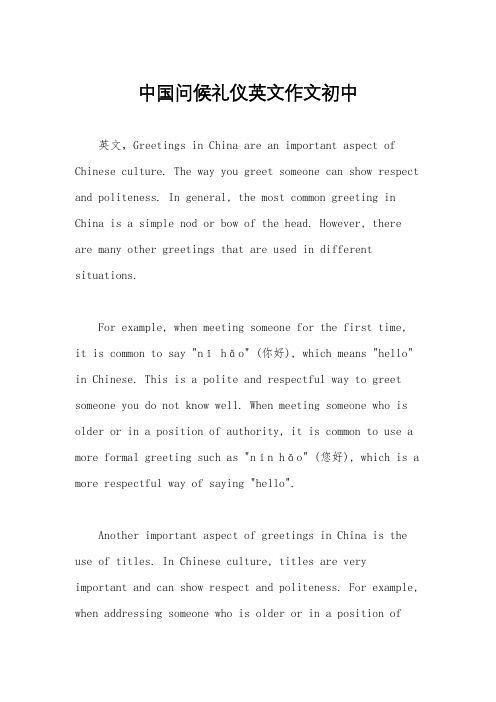
中国问候礼仪英文作文初中英文,Greetings in China are an important aspect of Chinese culture. The way you greet someone can show respect and politeness. In general, the most common greeting in China is a simple nod or bow of the head. However, there are many other greetings that are used in different situations.For example, when meeting someone for the first time,it is common to say "nǐ hǎo" (你好), which means "hello" in Chinese. This is a polite and respectful way to greet someone you do not know well. When meeting someone who is older or in a position of authority, it is common to use a more formal greeting such as "nín hǎo" (您好), which is a more respectful way of saying "hello".Another important aspect of greetings in China is the use of titles. In Chinese culture, titles are very important and can show respect and politeness. For example, when addressing someone who is older or in a position ofauthority, it is common to use their title followed by their surname. For example, if you were addressing a teacher named Zh ang, you would say "zhǔrèn zhāng" (主任张), which means "Director Zhang".中文,在中国,问候礼仪是中国文化中非常重要的一部分。
中国问候英文作文
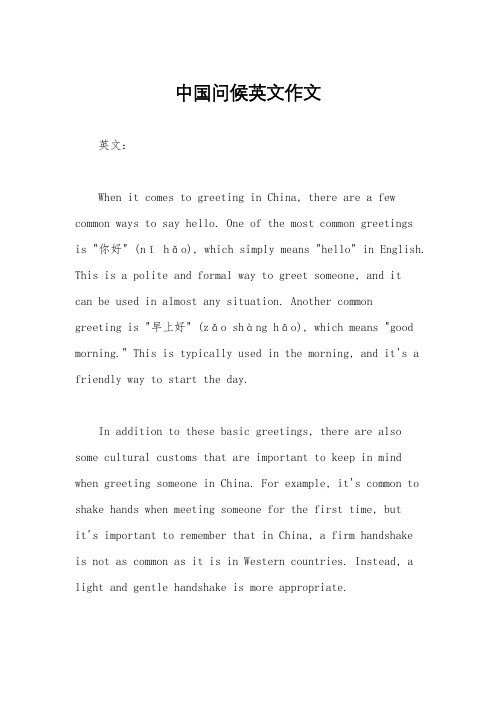
中国问候英文作文英文:When it comes to greeting in China, there are a few common ways to say hello. One of the most common greetingsis "你好" (nǐ hǎo), which simply means "hello" in English. This is a polite and formal way to greet someone, and itcan be used in almost any situation. Another commongreeting is "早上好" (zǎo shàng hǎo), which means "good morning." This is typically used in the morning, and it's a friendly way to start the day.In addition to these basic greetings, there are also some cultural customs that are important to keep in mind when greeting someone in China. For example, it's common to shake hands when meeting someone for the first time, butit's important to remember that in China, a firm handshakeis not as common as it is in Western countries. Instead, a light and gentle handshake is more appropriate.Another important aspect of greeting in China is theuse of titles and honorifics. For example, it's common to address someone by their title and last name, such as "张先生" (zhāng xiān shēng) for Mr. Zhang or "李太太" (lǐtài tài) for Mrs. Li. This shows respect and politeness, which are highly valued in Chinese culture.中文:在中国打招呼有几种常见的方式。
中国见面礼仪英语作文
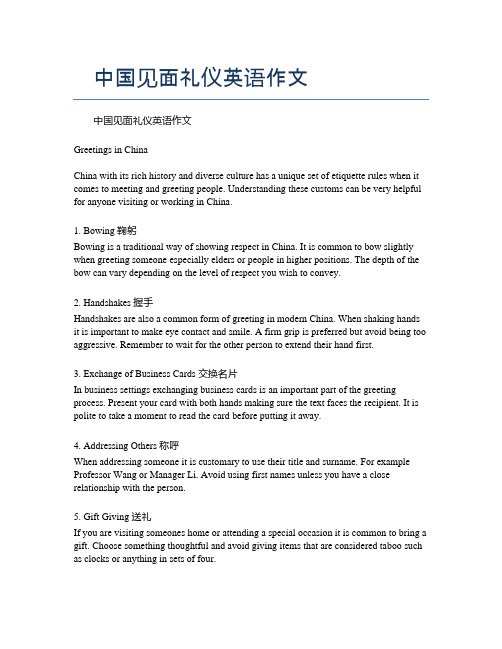
中国见面礼仪英语作文中国见面礼仪英语作文Greetings in ChinaChina with its rich history and diverse culture has a unique set of etiquette rules when it comes to meeting and greeting people. Understanding these customs can be very helpful for anyone visiting or working in China.1. Bowing 鞠躬Bowing is a traditional way of showing respect in China. It is common to bow slightly when greeting someone especially elders or people in higher positions. The depth of the bow can vary depending on the level of respect you wish to convey.2. Handshakes 握手Handshakes are also a common form of greeting in modern China. When shaking hands it is important to make eye contact and smile. A firm grip is preferred but avoid being too aggressive. Remember to wait for the other person to extend their hand first.3. Exchange of Business Cards 交换名片In business settings exchanging business cards is an important part of the greeting process. Present your card with both hands making sure the text faces the recipient. It is polite to take a moment to read the card before putting it away.4. Addressing Others 称呼When addressing someone it is customary to use their title and surname. For example Professor Wang or Manager Li. Avoid using first names unless you have a close relationship with the person.5. Gift Giving 送礼If you are visiting someones home or attending a special occasion it is common to bring a gift. Choose something thoughtful and avoid giving items that are considered taboo such as clocks or anything in sets of four.6. Dining Etiquette 餐桌礼仪When dining with others wait for the host to start eating before you begin. It is polite to use both chopsticks and a spoon and to avoid making loud noises while eating. If you need to use your phone excuse yourself from the table.7. Respect for Elders 尊敬长辈In Chinese culture showing respect to elders is very important. Always stand up when an elder enters the room and offer them a seat. Listen attentively when they speak and avoid interrupting.8. Personal Space 个人空间Chinese people generally have a smaller concept of personal space compared to Western cultures. It is common for people to stand close to each other while talking. However avoid touching someone without their permission.By being aware of these meeting and greeting etiquettes you can navigate social situations in China with more confidence and respect for local customs.中国见面礼仪英语作文中国以其悠久的历史和多元的文化拥有一套独特的见面和问候礼仪规则。
中国打招呼的礼仪作文英语
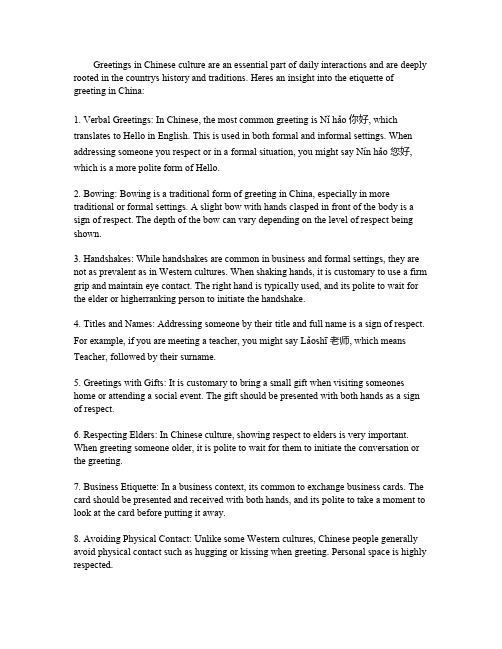
Greetings in Chinese culture are an essential part of daily interactions and are deeply rooted in the countrys history and traditions.Heres an insight into the etiquette of greeting in China:1.Verbal Greetings:In Chinese,the most common greeting is Nǐhǎo你好,which translates to Hello in English.This is used in both formal and informal settings.When addressing someone you respect or in a formal situation,you might say Nín hǎo您好, which is a more polite form of Hello.2.Bowing:Bowing is a traditional form of greeting in China,especially in more traditional or formal settings.A slight bow with hands clasped in front of the body is a sign of respect.The depth of the bow can vary depending on the level of respect being shown.3.Handshakes:While handshakes are common in business and formal settings,they are not as prevalent as in Western cultures.When shaking hands,it is customary to use a firm grip and maintain eye contact.The right hand is typically used,and its polite to wait for the elder or higherranking person to initiate the handshake.4.Titles and Names:Addressing someone by their title and full name is a sign of respect. For example,if you are meeting a teacher,you might say Lǎoshī老师,which means Teacher,followed by their surname.5.Greetings with Gifts:It is customary to bring a small gift when visiting someones home or attending a social event.The gift should be presented with both hands as a sign of respect.6.Respecting Elders:In Chinese culture,showing respect to elders is very important. When greeting someone older,it is polite to wait for them to initiate the conversation or the greeting.7.Business Etiquette:In a business context,its common to exchange business cards.The card should be presented and received with both hands,and its polite to take a moment to look at the card before putting it away.8.Avoiding Physical Contact:Unlike some Western cultures,Chinese people generally avoid physical contact such as hugging or kissing when greeting.Personal space is highly respected.9.Greetings During Festivals:During festivals like the Chinese New Year,its customary to say Xīnnián kuàilè新年快乐,which means Happy New Year.Gifts and red envelopes containing money are also common during this time.10.Online Greetings:With the rise of digital communication,online greetings have become more common.Phrases like Wǎnshàng hǎo晚上好for Good evening orZǎoshang hǎo早上好for Good morning are used in digital conversations. Understanding and practicing these greeting etiquettes can help you navigate social and business interactions in China with grace and respect.。
中国的问候方式英语作文
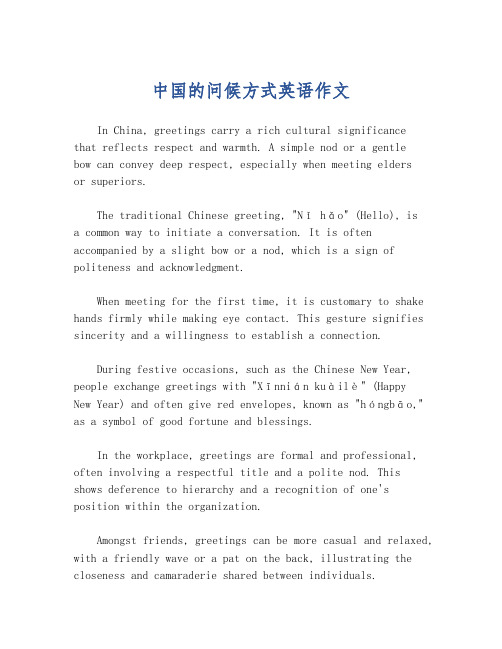
中国的问候方式英语作文In China, greetings carry a rich cultural significancethat reflects respect and warmth. A simple nod or a gentlebow can convey deep respect, especially when meeting eldersor superiors.The traditional Chinese greeting, "Nǐ hǎo" (Hello), isa common way to initiate a conversation. It is often accompanied by a slight bow or a nod, which is a sign of politeness and acknowledgment.When meeting for the first time, it is customary to shake hands firmly while making eye contact. This gesture signifies sincerity and a willingness to establish a connection.During festive occasions, such as the Chinese New Year, people exchange greetings with "Xīnnián kuàilè" (HappyNew Year) and of ten give red envelopes, known as "hóngbāo," as a symbol of good fortune and blessings.In the workplace, greetings are formal and professional, often involving a respectful title and a polite nod. This shows deference to hierarchy and a recognition of one's position within the organization.Amongst friends, greetings can be more casual and relaxed, with a friendly wave or a pat on the back, illustrating the closeness and camaraderie shared between individuals.In the digital age, Chinese people also adapt traditional greetings to online communication. Emojis and stickers are frequently used to express greetings in a fun and modern way.Overall, the art of greeting in China is a reflection of the country's deep-rooted values of respect, harmony, and connection, which continue to be cherished and practiced in everyday life.。
- 1、下载文档前请自行甄别文档内容的完整性,平台不提供额外的编辑、内容补充、找答案等附加服务。
- 2、"仅部分预览"的文档,不可在线预览部分如存在完整性等问题,可反馈申请退款(可完整预览的文档不适用该条件!)。
- 3、如文档侵犯您的权益,请联系客服反馈,我们会尽快为您处理(人工客服工作时间:9:00-18:30)。
hello, Joseph! I'm glad to hear that you are coming to work in china soon and it's my pleasure to introduce the chinese etiquette about meeting and greeting.
to start with, we need to understand what most Chinese in common. in China, etiquette plays a necessary role on chinese daily life. confucius who was one of the most famous people in ancient China was a wise philosopher. this Chinese man was a well-known leader in philosophy which is kind of a system of ideas and thoughts about the human's behavior. a lot of them are still circulating. so if you want to understand the Chinese etiquette, you have to learn more about confucius. confucius thought the highest goal of mankind is to be a gentleman. respect and concessions are necessary conditions for becoming a gentleman. chinese all behaviors are used to show their respect to others. in China we always look up to others which is different from the concept of equality in west Country.
in modern China people usually shake hands and Make small talk when they meet. Before that, you should dress up to have a clean and confident appearance at first. Chinese regard the hand-shaking as an important way to communicate ideas and emotions, and improve relationships. when you shake hands with others,you should look directly at each other, smile at each other, don't be absent-minded, don't 'look left or right, don't wear hats or gloves when shake hands with others, if you do, others will feel uncomfortable and offended. Under normal occasions, the hand-shaking should not exceed three seconds. what's more, you should pay attention to the order of handshake which is up to venerable. Usually,you can only shake hands when lady, senior or boss give their hands. if you have to shake hands with many people, you should follow the order of grade and status. bowing is also a way when meet others such as teacher or boss.However, hand-shaking and bowing are always used in formal occasion. In daily life, when you meet your colleagues, friends and relatives you just nod head or wave hands with smile or say hello even give a eye contact to show your politeness. I hear that people will kiss each other's face when they meet in west Country, but in china it will be thought impolite. In general, the Etiquette about
meeting depends on the relationships between you and intimacy others can accept and the occasion where you are.
In addition, small talk is also common. Small talk is a two-way emotional exchange, and its basic function is connecting relationships. In our work and life, whether we meet strangers or acquaintances, we need to have small talks to communicate with each other to create a harmonious atmosphere. For example, when you meet a stranger, you can talk about weather to start the topic, and If you see your friends wear a beautiful skirt, you can say“wow, what a beautiful skirt! You are so charming!”, if you meet y our colleagues on the road you can say “hello” ”good morning” or “do you have a breakfast” and so on. Sometimes, Chinese may ask “haven you eaten?” in west country, people will tell the truth and misunderstand it as asking to eat together, however it just means hello.
that's all i want to tell to you. most of chinese are tolerance and open,and the etiquette on meeting and greeting is not so serious,you don't need to worry about it so much. if you have any problems about work,just ask your colleagues or me,we would like to help you and your friends.。
